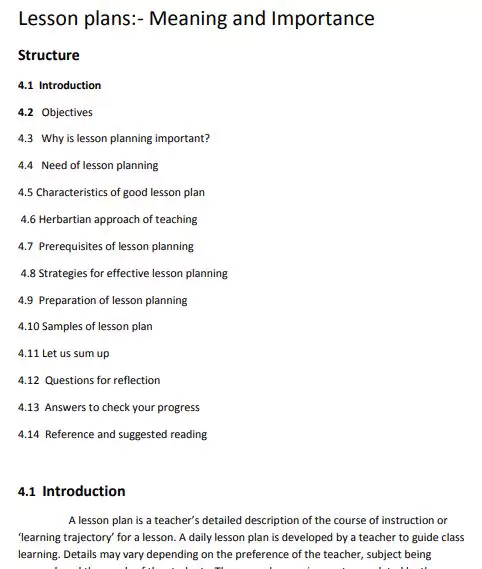‘Lesson Plan Meaning, Concept, Format’ PDF Quick download link is given at the bottom of this article. You can see the PDF demo, size of the PDF, page numbers, and direct download Free PDF of ‘Lesson Planning In Primary And Secondary Education’ using the download button.
What Is Lesson Planning Book PDF Free Download

Lesson Plan For Teachers
Introduction
A lesson plan is a teacher’s detailed description of the course of instruction or ‘learning trajectory’ for a lesson. A daily lesson plan is developed by a teacher to guide class learning.
Details may vary depending on the preference of the teacher, the subject being covered, and the needs of the students.
There may be requirements mandated by the school system regarding the plan.
A lesson plan is the teacher’s guide for running the particular lesson, and it includes the goal( what the students are supposed to learn), how the goal will be reached( the method, and procedure), and a way of measuring how well the goal was reached ( test, worksheets, homework etc.)
Objectives
After going through this unit, you will be able to:
Create a well-organized lesson plan
Understand the needs of the student and learning style
Be prepared and confident while teaching in the classroom
Help the students to achieve the aim/objective of the lesson
Why is lesson planning important?
Every teacher is required to prepare a lesson plan because this is considered a guide for the day’s lessons.
Lesson planning is important because it gives the teacher a concrete direction of what she/he wants to take up for the day.
Research has shown that student learning is correlated to teacher planning.
One major explanation is that when the plan is ready, teachers can focus on its implementation.
When teachers do not have to think so much about what they need to do next they are able to focus on other parts of the lesson.
Lesson planning is important because it helps teachers ensure that the day-to-day activities that go on in their classrooms are providing students with an adequate level of long–term progress toward the goals outlined in their scope and sequence, as well as their individual education plans when necessary.
An effective lesson plan includes several elements: learning objectives, quality questions, supplies, and activities.
It is important to have the learning objectives in mind because those should drive the development and implementation of all activities in the classroom.
Quality questions are inquiries that the teacher plans to direct to the students over the course of the lesson.
Sometimes these questions are rhetorical in nature, but more often they are designed to help the student think at a higher level than simple memorization and comprehension.
It is important to come up with a plan for assessment to determine whether the class has met its targets.
Lesson planning is a complex yet essential part of the teaching process that changes over time as teachers gain more hands-on experience.
Need for lesson planning
FAIL TO PLAN = PLAN TO FAIL
Through lesson planning the subject is organized properly.
It keeps the teacher free from the faults of thoughtless teaching.
It creates the proper atmosphere for the learning process.
The teacher also gets a clear idea about when they should start evaluation and when they should proceed to the next lesson.
Lesson plans help in organized teaching and save time.
Lesson plans allow the teacher to apply the appropriate strategy.
Teachers will be more prepared and confident while teaching the lesson.
Characteristics of good lesson planning
Learning to plan is just like any other skill. It takes time and practice.
At first lesson planning may seem like a time-consuming process but by creating detailed lesson plans as a beginner teacher one is able to develop routines that can become more automatic over time.
1) Lesson planning should be in written form.
2) In lesson planning, the general and important objectives should be clearly defined.
3) The lesson plan should relate to suitable teaching methods and their use.
4) A continuity component reviews and reflects on content from the previous lesson.
5) Subject, time, class, and the average age of the students should be mentioned in the lesson plan.
6) Important examples should be included in lesson planning.
7) Inspirational or motivational methods should be experimented with in lesson planning.
8) In lesson planning, the time for each topic should appropriately be pre-determined.
9) In lesson planning, the techniques and supportive materials of education like charts, maps, and other audio-visual materials and their utilization should be written.
| Author | – |
| Language | English |
| No. of Pages | 26 |
| PDF Size | 5 MB |
| Category | Education |
| Source/Credits | mpbou.com |
Workshop Calculation And Science 1st Year Book PDF
Budget Making Process In India PDF
Current Electricity Class 12 Notes CBSE Physics Chapter 3 PDF
Lesson Planning For Teachers PDF Free Download
